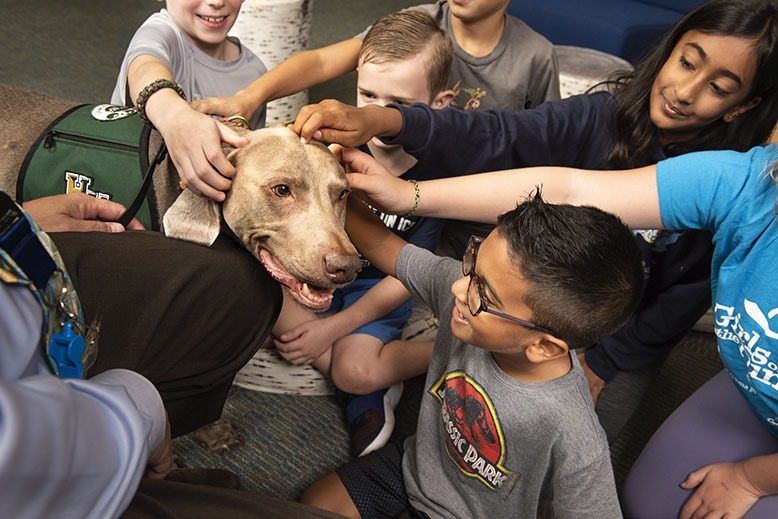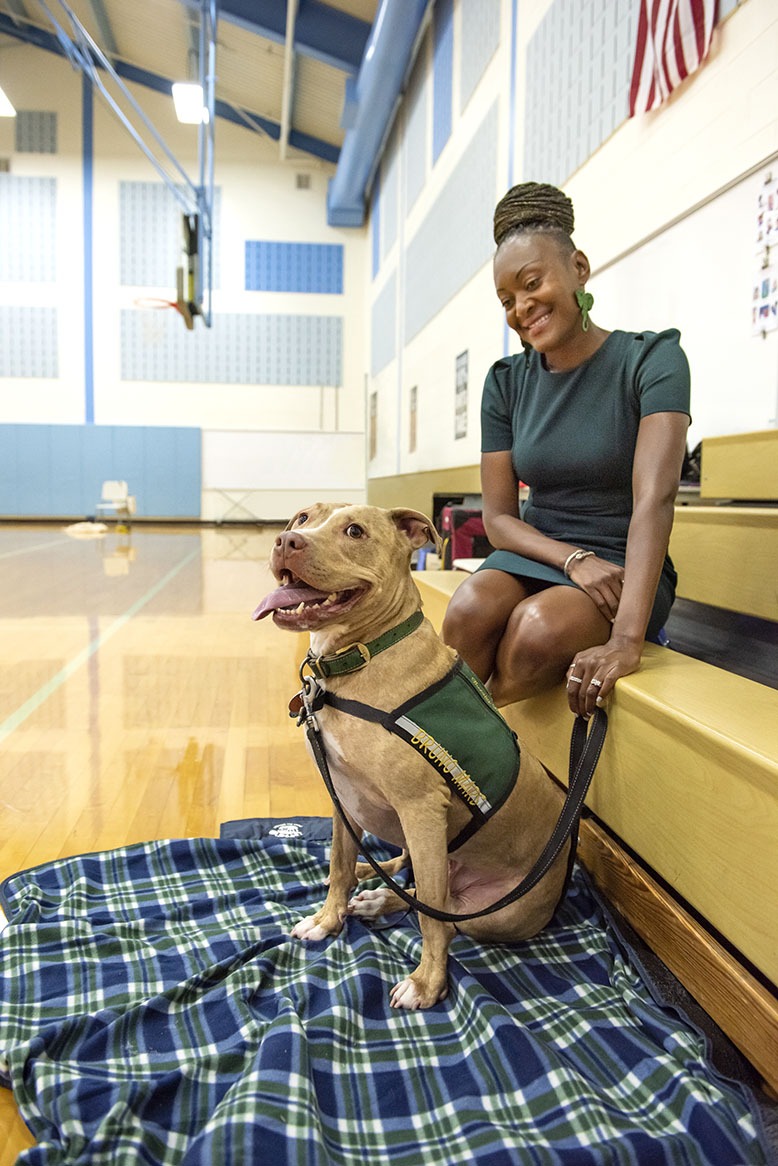
Harold Abraham’s childhood struggles with reading motivated him to ensure that none of his students fell through the cracks. As principal of Sandyston-Walpack Elementary School in Layton, Abraham saw the pandemic’s effect on students as they attended school on a hybrid basis in 2020.
“Routine is important,” says Abraham, who has a doctorate in education leadership, curriculum and instruction. “The disruption affected the children behaviorally, socially and academically.” Abraham decided to get creative to address the problem. He launched a new in-school initiative he calls Dog Tales, a dog-therapy program featuring Tyler, a 155-pound Great Pyrenees to whom students read to when the canine visits their classrooms.
Abraham says Tyler and handler/owner John Coco, who volunteers his services, are a perfect team. “Tyler has an incredible, very calm demeanor,” says Abraham. “Even though he’s a large dog, he’s very approachable.”
Tyler begins the school day in Abraham’s office, where he has a massive bed. Then he and Coco are off to the first of six classes, with the dog-and-trainer duo working their way around each classroom while the students read aloud. They visit the school twice a week.
“There’s a lot of pressure associated with reading,” says Abraham. “Children struggling with reading are less inclined to read.” But Tyler is nonjudgmental, so the children are eager to demonstrate their reading skills.
Tyler has gained some celebrity. He has been featured in news programs, and about 50 school districts have contacted Abraham about developing their own program. Soon, Tyler’s brother Charlie will join the staff, with Coco’s wife as his handler.
At Hopewell Valley Regional School District, therapy dogs served a different purpose. Students were grieving when a classmate took her own life in April 2019. Although quiet rooms were available for discussion and counselors were on hand, the sobbing children weren’t talking, so the director of counseling brought in therapy dogs from Attitudes in Reverse (AIR), a therapy-dog training program that had been on hand during finals and midterms. The dogs and their handlers visited the school daily for a week, in 20-minute stints. The saddened children hugged the dogs and began to talk to each other and to the animals.
In the summer of 2019, the school district in Hopewell formed a partnership with AIR. Eight administrators, including Rosetta Treece, now superintendent of schools, volunteered to train their pets to become therapy dogs, with the goal of having a dog in each of the district’s six buildings.
“I didn’t even have a dog,” says Treece, who wound up adopting a pit bull. “The training took a year and a half and was a lot of work.”

Rosetta Treece, superintendent of Hopewell Valley Regional schools, with pit bull Bruno Mars, whom she adopted and trained to be a therapy dog. Photo courtesy of Peter Murphy
Now, 16 cerrified volunteers, including board members, counselors, and administrators, are available for support with their animals.
“Therapy dogs provide a way for someone to share emotion and talk about what is bothering them,” says Treece. “That’s the magic of a therapy dog.” Therapy dogs were even present at the funeral of the student who died. “The presence of the dogs helped everyone,” she says. “They really are a comfort.”
At the Henry Hudson Regional School in Highlands, an 8-year-old goldendoodle named Hudson has been soothing stressed 7th–12th graders since 2014. When special education teacher Kathy Noland sought a way to communicate with a 12-year-old who couldn’t tolerate sounds and hid under desks, she and principal Lenore Kinsgsmore, both animal lovers, liked the idea of a dog-therapy program, though there were none in New Jersey schools at the time. After learning that goldendoodles are smart, hypoallergenic and good with children, they obtained a grant to cover Hudson’s purchase and other expenses.
“Hudson is in the school every day,” says Kingsmore. “It’s been an immensely rewarding program that has helped many students,” including the child who inspired the program.
While the program was initially intended for special education students, any child in crisis can visit Hudson in Noland’s classroom. “Hudson relieves the stress of children who need the comfort he provides,” says Kingsmore. “The children pet Hudson, lie down with him, talk to him, and share their feelings with him.”
Hudson seems to sense when a child needs help. “We can be walking down a hallway, and suddenly Hudson will pull me toward a classroom, go right up to a child, and put his paws around him for a hug,” says Kingsmore.
“You can just see that the weight of the world is off the child’s shoulders. I don’t know how he does it, but it’s just amazing.”
Eleanor Gilman is a frequent contributor to New Jersey Monthly.
No one knows New Jersey like we do. Sign up for one (or more!) of our newsletters to get the best of where we live sent to your inbox every week. Want a print magazine mailed to your home? Purchase an issue from our online store.
